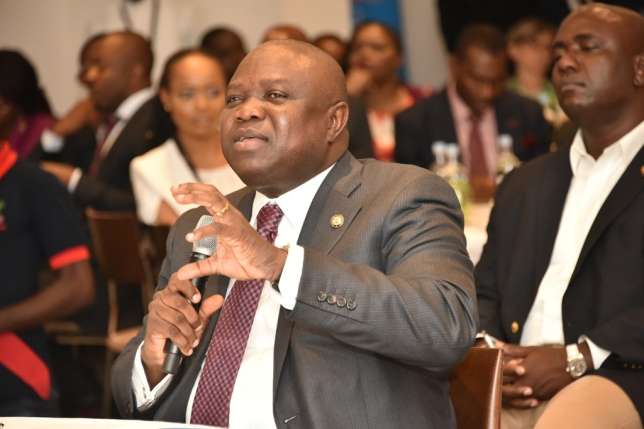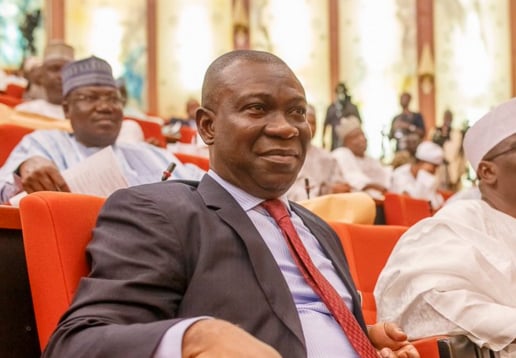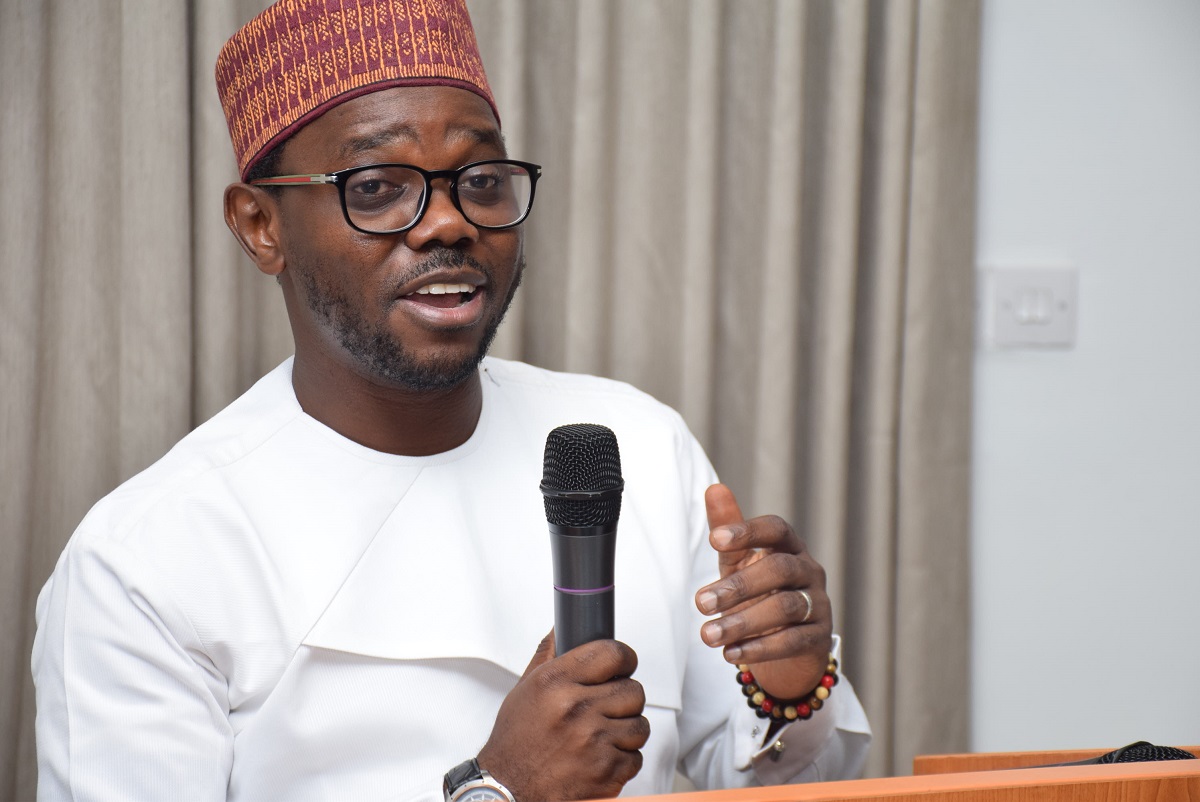On January 29, 2018, the Lagos state house of assembly passed the land use charge bill and Akinwunmi Ambode, governor of the state signed it into law on February 8. Eleven days after, pictures of the governor paying his own charge at a branch of Guaranty Trust Bank (GTB) in Ikeja were circulated on social media. There couldn’t have been a better means of advertising the law.
According to the new law, “a property solely occupied by the owner for a residential purpose will be charged at a rate of 0.076 percent per annum. A property occupied by the owner and tenant(s) or third parties will be charged 0.256 percent per annum, while an investment property fully occupied by tenants or third party(ies) for revenue generation will be charged at 0.76 percent per annum.”
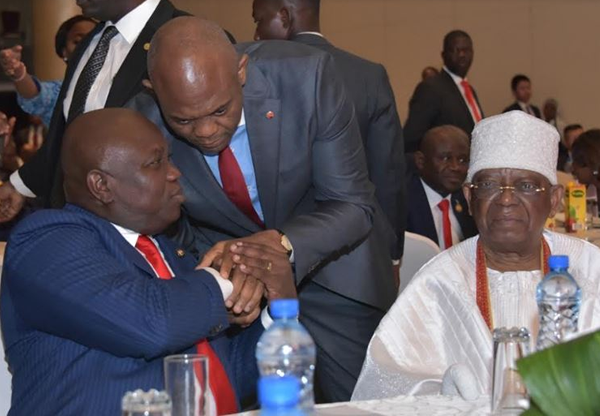
New rates of the charge were sent to Lagosians in February and they were expected to pay, while failure to do so attracted penalties such as a 25 percent increase if payment was not made between 45 and 75 days after notice; a 50 percent increase after 105 days; and a 100 percent increase if payment is made between 75 and 105 days.
The law prescribes that a property shall be liable to enforcement if payment is not made after 135 days of notice. But after high wave of criticisms and condemnation, the government extended the period of implementation till April 14, 2018.
Advertisement
Justifying the increase in LUC, Ambode said the law had not been reviewed since 2001.
“The law was made in 2001. It provides that every five years, we should review it and also find a way to increase. Fifteen years after in 2017, the law has never been reviewed,” Ambode had said at a conference.
He also said the rates were determined by the present value of properties which has “appreciated since the last review in 2001”.
Advertisement
“Now, the question is this: those who are having commercial properties, the rental income they were getting in 2002 as against the rental income they are getting in 2017, is it the same?” he asked.
“The level of infrastructure that existed in 2002 as against what has happened in the last 15 years, are they the same? Did it not come at a cost? So, why is the market value of the property that you built with one million naira, 15 years after, you are selling at N20 million. Why do you think somebody who is a buyer will pay N20million for it? Is it not because of the facilities around the property? So, we have to sacrifice; that is how it works everywhere.
“So, somebody comes and say we have increased by 400 percent. The question is the 400 percent of what? You were paying N10, 000 before, now we say you should pay N50, 000 and you are calculating and turning statistics upside down by saying it is 400 percent.”
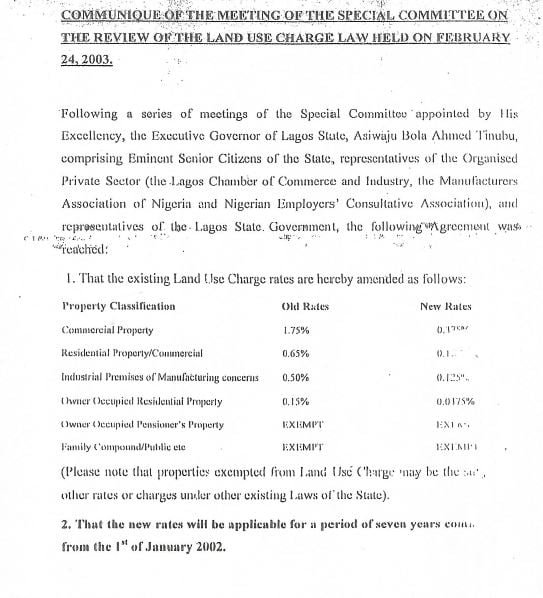
LAND USE CHARGE REVIEWED THRICE
According to checks by TheCable, the law has been reviewed three times. After the original bill was signed into law in 2001, it was reviewed by the administrations of Bola Tinubu and Babatunde Fashola, former governors of the state. While Tinubu reviewed it in 2003, Fashola did so in 2008 and 2012.
Advertisement
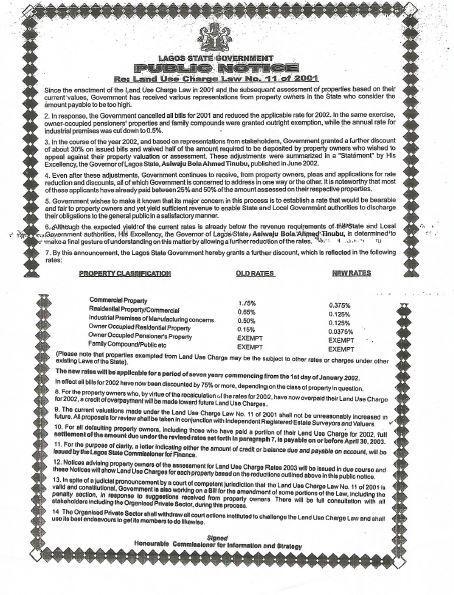
This is contrary to Ambode’s claim that the law has never been reviewed.
In 2003, Tinubu set up a special committee chaired by Lateef Okunnu, the renowned lawyer, to review the law.
At the end of its sitting, the committee published a communique. One of the recommendations was a downward review of the rates. In line with that, Lagos state cut the rates in 2003.
Commercial properties were then charged at 0.375%, residential property/commercial at 0.125%, industrial premises of manufacturing concerns at 0.125%, owner-occupied/residential property at 0.0375, owner-occupied pensioner property and family compound/public were also exempted.
Advertisement
“In effect, all bills for 2002 have now been discounted by 75% or more depending on the class of property in question,” the communique read.
“That property owners, who by the virtue of recalculation of the rates for 2002, have ow overpaid their land use charge for 2002, a credit of overpayment will be made towards future land use charges.
Advertisement
WARNING AGAINST “UNREASONABLE” INCREASE
Provision (4) of the 2003 review warned that “the current valuations made under the land use charge law of No 11 0f 2001, shall not be unreasonably increased in future. All proposals for review shall be taken in conjunction with independent registered estate surveyors and valuers.”
Based on this recommendation, a strong argument can be made that the current administration disregarded the recommendation of the Okunnu committee.
Advertisement
UNDER FASHOLA
In 2012, the administration of Fashola reviewed the charge to reflect an increase in all categories except pensioners, family compounds and religious properties.
As of the last review in 2012, commercial properties attracted a rate of 0.394%; a property solely occupied by the owner for residential purpose was charged at a rate of 0.0394%; while a similar property occupied by the property owner and tenant(s) or third parties will be charged at a rate of 0.132%. An investment property fully occupied by tenants or third party (ies) for revenue generation, was charged at a rate of 0.394%.”
Advertisement
A SUMMARY OF THE THREE REVIEWS
| 2001(%) | 2003(%) | 2008(%) | 2012(%) | 2018(%) | |
|---|---|---|---|---|---|
| Commercial property | 1.75 | 0.375% | 0.375 | 0.394 | 0.76 |
| Residential property/commercial | 0.65 | 0.125 | 0.375 | 0.394 | 0.256 |
| Industrial premises | 0.50 | 0.125 | 0.125 | 0.132 | |
| Owner-occupied residential property | 0.15 | 0.0375 | 0.375 | 0.0394 | 0.076 |
| Pensioners | Exempt | Exempt | Exempt | Exempt | Exempt |
| Family compound/religious properties | Exempt | Exempt | Exempt | Exempt | Exempt |
CONSULTATION, REGULATION, ‘CONSIDERATION’
Ambode has been accused of “force-feeding” Lagosians with the new law. The state government reportedly did not make due consultations with the relevant stakeholders before initiating the increase in the charge.
And, it went ahead to demand implementation of the regulation same month it was passed, without prior notice to residents of the state.
It was only after much complaints and criticisms from the populace, that the government extended the grace period for defaulters.
CONCLUSION
Reacting to the controversy on the review of the law, Kehinde Bamigbetan, commissioner for information, told TheCable that the bill was repealed under the Ambode administration. He admitted that the previous administrations reviewed the law.
“What happened in 2012 is a review; what is happening now is a repeal. In 2012, parts of the law were reviewed but what is happening now is a total transformation of the law,” he said.
But since Ambode used the word review, not repeal, the claim of the governor is false. It is incorrect to say the land use charge had never been reviewed since inception. Records prove otherwise.
Add a comment

